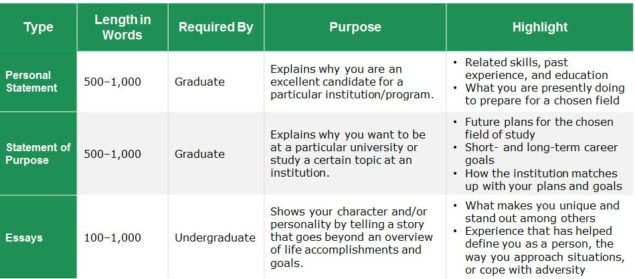Writing Great Personal Essays: Inside Tips from an Admissions Expert
Friday | January 24, 2014 | by WES Advisor

In this post, WES Advisor sits down with Morgan Volkart, the director of international recruitment at Lehigh University in Bethlehem, PA.
We asked her to provide guidance to prospective international students on how to write a great personal essay.
Morgan, can you explain the importance of the personal essay in a U.S. college application?
Although essay writing is a time-consuming and sometimes tedious task, it is part of the process to not only show that you can write well in English, but also to help you stand out among many qualified applicants. It also helps the admissions officer get to know you outside of just test scores and grades while determining if you’re a good fit for the institution. It’s really an opportunity for you to tell your story and is one of the few pieces of the application over which you have full control.
The essay is especially important for selective institutions, where a majority of the thousands of applicants for limited spots fall within the academic profile for a particular school. With strong competition and many academically qualified applicants for limited spots in a given class year, the essay becomes even more important for the student to stand out in the application process. I would go as far as to say that a captivating and well-written essay can sometimes be a decisive factor when admissions committees are comparing students who all match up similarly academically.
Can you explain the similarities and differences between personal statements, statements of purpose, and college essays?
Graduate programs are looking to see that you have relevant skills—including educational and work or research experiences—that fit and will add to the program you are applying to. Therefore, the personal statement should provide a good sense of why you are an excellent candidate for that particular institution/program based on related skills, past experience and education, and what you are currently doing.
The statement of purpose explains why you want to be at a particular university or study a certain topic at the institution and is typically more concentrated on your future plans for the chosen field of study.
On the other hand, most undergraduate programs requiring the “college essay” or “personal essay” are generally trying to gauge whether you are going to add something a little different to the campus and be an engaged member of the campus community. In many cases, students don’t know what they want to major in yet and don’t have any previous research or work experience. Therefore, the undergraduate college/personal essay is meant to be more personal, allowing for creativity, to give the admissions counselors insight into your personality and characteristics that will help you to succeed, stand out, show that you will take advantage of opportunities, and add something a little different to the campus community.
Below are characteristics of personal statements, statements of purpose, and college essays:
As an admissions officer, what are some of the most common mistakes you encounter in essays from international students?
Some students tend to repeat what is provided elsewhere in the application when the essay is really the space to highlight what you want us to know outside of what has already been provided or to elaborate on something that is important to you. In addition, it’s obvious when students are trying to write what they think admissions counselors want to hear, which results in an essay that does not seem genuine.
Another mistake is getting off topic or going off on tangents. Be concise and choose your words wisely without using the same words over and over to get your point across. This will also help you to stay within the word limit. Rushing the essay writing process or procrastinating is probably the most common mistake. It’s critical to make time for the entire process from brainstorming topics to writing drafts and having time to set the draft aside and then pick it up the next day or week to make edits and get a second and third opinion.
Finally, never make up false information or copy and paste anything into your essay, and never have someone write it for you or even translate an essay from your native language to English. This is very apparent to those of us who read it.
Could you explain some of the best essays you’ve read and why they were great?
I can give you some examples from my experience reading essays for undergraduate admission, which differ from the personal statement and statement of purpose as mentioned earlier. The outstanding essays have been the ones that not only portray passion and authenticity, but are also well organized, concise, creative, and sometimes throw the reader for a loop.
For instance, some of the best essays were those that revealed something personal that I was not expecting based on other parts of the application; for example, a student applying to the engineering college wrote about a deep passion for reading and writing poetry. Another outstanding essay came from a young lady who wrote her essay from the perspective of her running shoes. It was creative, her passion for running came through, and her resiliency in the face of daily struggles in her life and when running was interesting to read about from start to finish.
Furthermore, some students can write very touching essays about influential people in their lives or a tragic loss that they have coped with. When writing about any kind of impactful event or person in your life, be sure to bring the focus back to you, to show why this experience or person was important for you personally. Overall, as long as adequate time is put into the essay, the writing comes from the heart, and is about what the writer is genuinely excited or passionate about, the essay is usually a good one.
Lastly, if students are having difficulties writing their essays what are some resources that can help them through this process?
Use your friends, family, and teachers who know you well as a resource. However, designate no more than two or three people who you trust to proofread your essay multiple times. Having more than a few people involved can be problematic. With more people editing the essay, the voice of the writer can get lost and the essay won’t seem as genuine. Having proofreaders who know you well will also help the essay to be an authentic reflection of yourself.
Use the admissions office as a resource. If you need clarifications about the essay portion of an application for a specific school, don’t hesitate to email or call the school to ask questions. For instance, many students have questions about essay length, going over the word limit, spacing, font, submission process, etc. You may get different answers to these sorts of questions depending on the schools you are applying to and how they require you to submit your application. Every school is different, so I recommend emailing or calling to ask if you have any questions at all.
Finally, check out free online resources and webinars, starting with:
